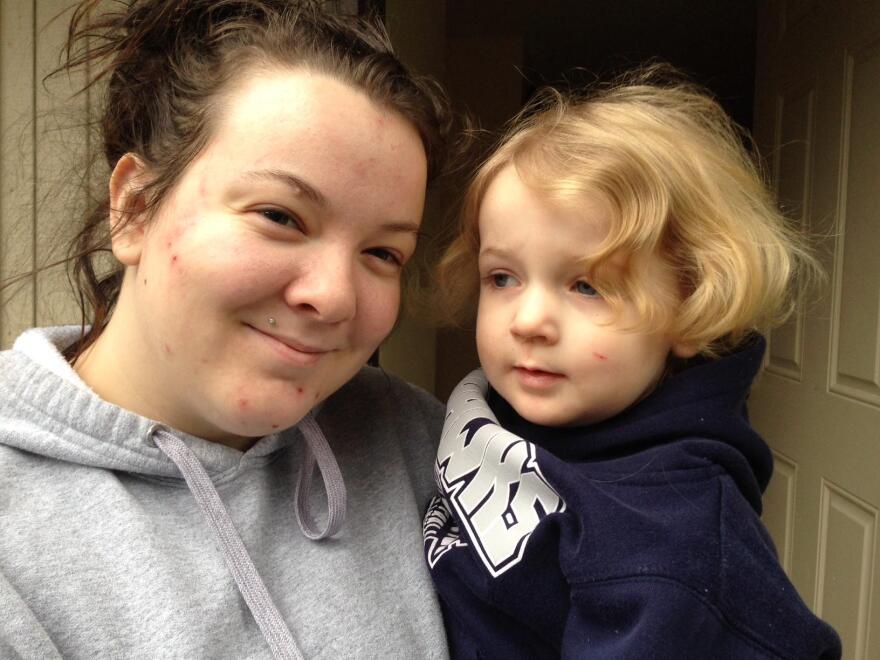Rural Thurston County in Washington is the kind of place people move to for a little elbow room. But if you’re a teenager from the suburbs, life can be less than exciting.
The day 19-year-old Amber Armstrong arrived at her foster home five years ago, she starting plotting her escape.
"I was like, 'Where the heck is this? And why am I out here?’" Armstrong recalled. "I actually sat on my tubs of my stuff out in their front porch, pissed off because I didn’t want to live there. And I was out in the middle of nowhere."
A Pattern Of Running Away
The state of Washington is under court order to address the problem of foster children who run away. Each year, some 400 Washington foster kids run, some will leave more than once.
“It was like my first thought. ‘How am I going to run away? How am I going to get out of here?’” Armstrong said.
This was nothing new. Armstrong already had a history of running away from foster care. When she came to this rural house in 2009 — crossing the railroad tracks, passing the llama corral — she had bounced in and out of four foster homes in a single month.
"This was kind of like a last resort," she said. "This is the last place that anybody would take me. They take troubled teenage girls, so this was like, they thought, the place for me.”
For the next three years, she would test that thinking every chance she got. Soon after moving in, she hit her foster dad in the head with a phone, slapped her foster mom and threw a glass vase at one of the other girls living in the house.
“I just had a lot of anger. I was an angry kid,” she said.
Armstrong chafed under the strict house rules. She felt trapped in the middle of nowhere. She longed for freedom.
"I think the first time I ran away, I ran away from school," Armstrong said. "I went and stayed with one of the girls that lived here and her boyfriend, and he was a meth dealer.”
A week later, she turned herself in. This cycle would repeat itself numerous times over the next couple of years.
'At High Risk Of Sexual Exploitation, Drug Use, Survival Crimes'
Returning to the former foster home recently, Armstrong was greeted by a barking dog. Her former foster parents were not in. She pointed to a second-story window.
"I remember climbing out that window," she said. "I had one of the girls do the sheet trick, and I actually fell and hurt my ankle. I think I sprained it, actually. Yeah, it’s pretty weird since I haven’t been here in a while. It’s strange.”
Armstrong's story, though, not strange. Roughly 3 percent to 4 percent of Washington foster youth run away every year. The state is under court order to bring that down.
Mary Van Cleve, an attorney with Columbia Legal Services, says when foster youth run, bad things happen.
"They are high risk of sexual exploitation. They’re at high risk of drug use. They’re at high risk of committing survival crimes just to get by day-to-day," Van Cleve said.
Columbia Legal Services has said the state is not doing enough to address the runaway problem.
Jennifer Strus, the assistant secretary in charge of foster care at Washington’s Department of Social and Health Services, has a different view.
"I would say that I think we’re doing the best we can with the resources we currently have," Strus said.
Strus says the number of foster runaways and the number of days they’re gone is going down. She credits the hiring of six “locators.” These are people whose sole job is to find foster runaways and bring them in. But that’s just the beginning. The next step is to find out why the youth ran in the first place.
"You know, sometimes we have to move kids," Strus said. "They’re not in a good place; their placement is not appropriate. It just doesn’t work."
Why Foster Kids Run Away
National studies have shown that foster youth run away most often because they don’t like where they’re living or they want to reconnect with family or friends. Girls are more likely to run than boys. Youth who’ve moved from home to home run more often.
For Armstrong, running away was an escape. But it also led to trouble. She was introduced to meth and alcohol. She missed tons of school. She did time in juvenile detention.
Eventually she stopped running. And for that she credits her foster parents.
"No matter how many times I ran away, they still always took me back. And that’s what didn’t happen with other foster homes," Armstrong said.
But the long-term damage had been done. She struggled with addiction. She didn’t graduate from high school. Then came the thing that changed everything: She got pregnant.
"I was going to give her up for adoption because I was so scared," Armstrong said. "I was only 16."
In the end, she kept her baby. Today her daughter, Janessa, is 2.
A New Life

Asked what the foster system could have done better, Armstrong says it could have listened to her better.
Armstrong said her main regret is getting mixed up with drugs. It almost cost her Janessa. She’s clean now, has a job and is working to get her GED.
"I’ve already kind of lived that lifestyle of running free and getting to do what I want and doing drugs. And I definitely don’t want to do that. And it’s not the right way to go," she said.





